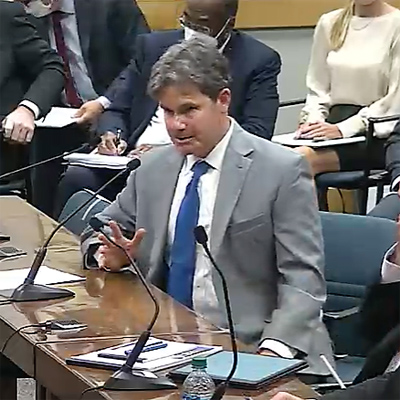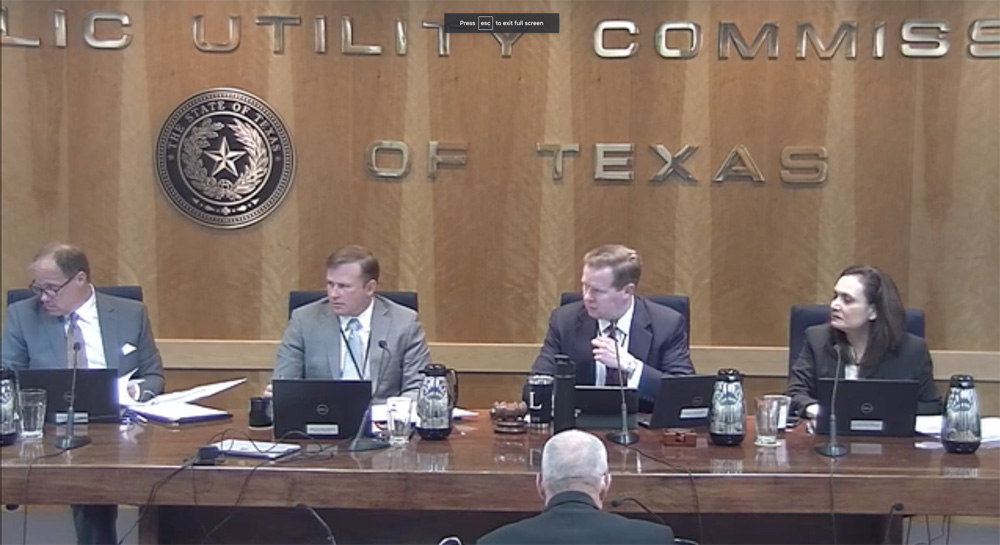
Hearings began Monday before the Texas Public Utility Commission over ERCOT’s request for a pair of debt-obligation orders to finance $2.9 billion in market debt stemming from high prices during February’s devastating winter storm.
The grid operator’s first application proposes financing the $800 million owed to ERCOT by market participants during the storm’s Feb. 12-20 emergency period (52321). The second proposes a $2.1 billion market uplift to cover short pays to the market (52322). (See “Staff File for $2.9B in Debt Recovery from Winter Storm,” ERCOT Briefs: Week of July 19, 2021.)
Both proposals are a result of legislation passed earlier this year during the 87th Texas Legislature, allowing the securitization of various debts incurred during the storm. (See Securitization Offers Texas a Way Forward.)
As of Aug. 2, the ERCOT market was short $2.98 billion from transactions during the storm.

ERCOT CFO Sean Taylor and Kenan Ögelman, vice president of commercial operations, were the only witnesses to take the stand Monday morning. They were briefly cross examined by attorneys representing Calpine and Golden Spread Electric Cooperative and fielded a few questions from the commissioners before the hearing was adjourned after 92 minutes.
Hearings on the $2.1 billion request will resume Tuesday at 1 p.m. CT.
The $800 million debt obligation would apply to amounts owed to ERCOT by market participants during the emergency period and subject to market uplift; the revenue auction receipts staff used to temporarily reduce short-pay amounts; and reasonable costs incurred by a state agency or ERCOT to implement the debt-obligation order.
The $2.1 billion debt obligation would cover “extraordinary” uplift charges assessed to the market’s load-serving entities for energy consumption during the emergency period, including reliability deployment price adder charges and ancillary service costs above the commission’s systemwide offer cap.
The grid operator has asked to recover the amount financed by imposing monthly uplift charges to qualified scheduling entities (QSEs) based on the load ratio share of their eligible LSEs. ERCOT said it doesn’t have the financial relationships between LSE and QSEs and can’t determine the eligible costs without quantifying the LSEs’ actual exposure. It asked the PUC to open a parallel proceeding to allow LSEs and the commission to determine the final uplift balance.
A group of Texas lawmakers and Lt. Gov. Dan Patrick have both filed comments in the $2.1 billion docket urging the PUC to follow the intent of House Bill 4492, which authorized the securitization, by “netting” the amount of debt generated during the storm that would be passed on to ratepayers. Netting would help account for companies that own both generators and retailers, canceling out debt so that only the net is used to determine whether or ERCOT will allow a member to qualify for its debt to be paid off by ratepayers.
Rep. Chris Paddie (R), the bill’s author, earlier filed a letter saying his bill “does not contemplate or authorize any ‘netting’ between companies.”
“If it was his intent to give taxpayer dollars to companies that profited during the storm instead of to those who were actually exposed to extraordinary costs and damages, I can confidently say that was not the understanding or intent of the Texas Senate when it passed HB 4492,” Patrick said in his filing.
During Thursday’s open meeting, the PUC opened a parallel proceeding to split the docket into a depository for comments and the verification of the type of market participants involved. The latter proceeding will be used to document the process for allocating funding; determine the amount, if any, of eligible charges that exceed $2.1 billion; and develop a methodology for pro-rating those amounts.
ERCOT Sees Demand Picking up
ERCOT’s Kristi Hobbs told the commission during its open meeting that summer heat and demand will pick up this week after statewide rains last week helped tamp down both.
Hobbs, the grid operator’s vice president of corporate strategy and PUC relations, said staff expect demand to return to the 70- to 73-GW range. ERCOT’s projected record peak of 77.1 GW this summer would break the all-time record of 74.8 GW set in August 2019, but demand has topped out at 72.9 GW so far.
Wednesday’s peak barely climbed over 60 GW as rain and cloud cover enveloped much of Texas. The week’s high peak came on Friday, when demand topped out at nearly 72 GW.
Hobbs said ERCOT is continuing its conservative operations approach, procuring greater amounts of ancillary services and doing so earlier. The grid operator began the summer with a reserve margin of 15% but has had to compensate for continued forced thermal outages and intermittent renewable resources.
“We’ll continue to evaluate our ancillary services [procurement] to ensure we’re operating in a conservative manner,” Hobbs said. “We want to make sure we continue to remind people that we have conservation in our toolkit to ask Texans to help keep the grid reliable.”
AEP Tx Project Remanded
The commission remanded AEP Texas’ (NASDAQ:AEP) application for a 345-kV transmission line in South Texas to the Office of Administrative Hearings, saying that the proposed route was $20 million more expensive than other alternatives (51912).
AEP reached a settlement with landowners over the $71.9 million project, endorsed by ERCOT as a reliability need to serve growing industrial load in the Corpus Christi area, but that did little to sway the commissioners. The agreed-upon route is at the high end of the utility’s $51.8 million to $72.9 million range.

“I don’t hear a lot of enthusiasm for a 40%, $20 million increase,” Lake said. “The fastest way to get this done would be for the parties to find a reasonable settlement that doesn’t cost the ratepayers an extraordinary amount of money.”
In other actions, the PUC:
- approved Rayburn Country Electric Cooperative’s sale of a 30-mile segment of a 138-kV line to East Texas Electric Cooperative (51776). The joint application was made in January, before Rayburn was hit with sky-high invoices during the February storm that have left the cooperative more than $640 million short to the market.
- rejected a rulemaking request by electric retailers to limit the length of disconnection moratoriums, saying it would “jeopardize” the PUC’s ability to “align its rules with statute in a timely fashion” (52200).
- signed off on 14 rule changes endorsed by ERCOT’s stakeholders and Board of Directors (52307).



